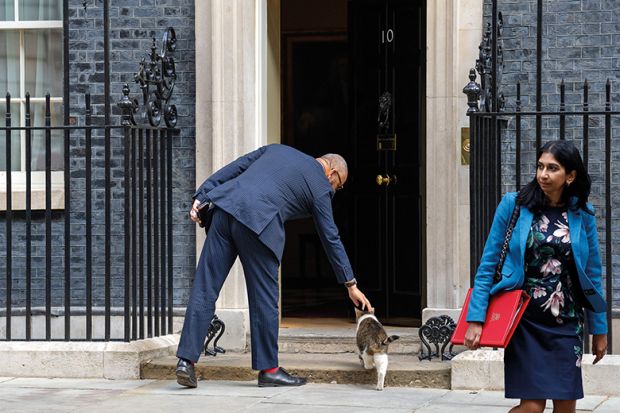Changes at the Home Office this week are likely to be given a cautious welcome by many in higher education. This is not a reflection of prevailing political opinions within universities – in my experience, the sector is far more ideologically diverse than some critics believe. Rather, it is a reflection of the role the outgoing home secretary reportedly played in seeking changes to student immigration, which could have undermined the competitiveness of an export sector where the UK is a genuine world leader.
We are not talking here about reforms designed to boost resilience and address genuine issues around potentially fraudulent applications. No one working within universities wants to see a system that can be exploited. Instead, what we have seen are repeated media stories emerging from “Home Office sources” questioning the future of the post-study visa route, along with other changes that would influence the fundamental attractiveness of the UK as a destination for high-quality overseas students and staff.
The arrival of James Cleverly as home secretary is a chance to reset the agenda and provide a warmer welcome towards a group of people who bring skills, resources and so much more with them to UK universities and the local communities they support, and who contribute significantly to UK soft power when they leave.
Last week, the Russell Group published A Bright Future, a “manifesto” that sets out how our universities are ready to work with the next government to build a bright future for the UK. Alongside policies that would help safeguard the skills pipeline and maximise the impact of R&D, one of our proposals is for a new international education strategy (IES) that builds on the UK’s strong position as a global higher education powerhouse. This is certainly one area where we don’t need to wait for the general election to make a start.
Backed by reforms such as reintroduction of the graduate route, the current international education strategy has helped the UK thrive in an increasingly competitive international market. Through their tuition fees and wider spending, the students we have been able to attract have supported investment in continued excellent education for home students, ensured that courses remain sustainable and helped underpin our world-leading research base.
International students also enrich the learning experience across campuses and make a positive contribution in intangible ways – such as through long-lasting friendships that individuals can draw on in future years. Communities in every corner of the UK have benefited from the skills and experiences of international students and the income they generate for local businesses. Whichever way you choose to cut it, international students are net contributors to the UK.
Similarly, the UK benefits hugely from top international staff choosing to come here and join our universities. However, recent changes to visa and health surcharge fees make that choice ever more difficult for this highly mobile and highly talented group of individuals. Interestingly, the General Medical Council reported this week that 52 per cent of the doctors who joined the NHS workforce in 2022 earned their medical degrees abroad and, even with the planned expansion of UK medical school places, 32 per cent of all doctors will be international medical graduates in 2036. Getting visa and immigration policies right is, therefore, not just an issue for the university and research community, but for a core part of the public sector, too.
A proper joined-up approach across government departments to maximise the benefits of international students and staff would pay huge dividends for the UK. As a recent report by the Higher Education Policy Institute noted, increasing the UK’s market share of global education exports by just 1 per cent would have an economic impact of more than £5 billion. That would be a success worth celebrating – and facilitating an expansion in international students would be a relatively foolproof way to achieve it.
Positive policy change followed by a period of stability would also enable universities to build sustainable recruitment strategies with confidence. This is of particular importance as the sector continues work to expand into new markets and seeks to diversify international recruitment further.
While Cleverly’s period as education secretary may have been brief, it was hopefully long enough for him to see first-hand the positive contribution that universities make across all four nations. As our new home secretary, he now has the chance to help us enhance that contribution even further by working with us to further leverage the enormous value that international students and staff bring to the UK.
Tim Bradshaw is chief executive of the Russell Group.
Register to continue
Why register?
- Registration is free and only takes a moment
- Once registered, you can read 3 articles a month
- Sign up for our newsletter
Subscribe
Or subscribe for unlimited access to:
- Unlimited access to news, views, insights & reviews
- Digital editions
- Digital access to THE’s university and college rankings analysis
Already registered or a current subscriber? Login








